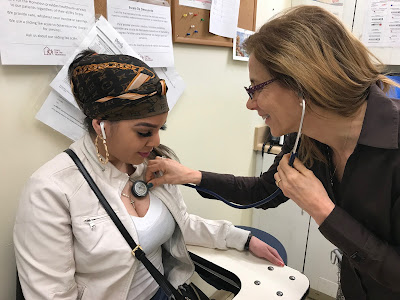Patient Stories Vol. 1 | The Unmistakable Merits of Trust
Sahira's Story
 |
| Sahira getting her heart rate checked by Joy. |
No more than 4 months ago, Sahira P. came to Care For the
Homeless’ (CFH) Susan’s Place Health Center in the Bronx for a routine
check-up. However, there was something else on her mind aside from taking her
blood pressure and checking her resting heart rate.
It turned out she had been struggling with a Percocet
addiction.
As is the case with many CFH patients, Sahira was (at first)
apprehensive about telling her story, despite her intense desire to do so. “I
was dying to tell somebody my story,” she commented. “But, I was afraid someone
would judge me.”
Judgement is just one of the many legitimate concerns CFH
patients have when seeking medical services. Negative past experiences and
financial insecurities lead patients to believe that they’ll also be, either
turned away by providers or treated poorly by them. These complex concerns
yield a litany of negative consequences. Perhaps the most severe of which, is
that individuals are discouraged from accessing care. Absence of care allows
chronic conditions to fester and continue to cause irreparable damage.
Of the 300+ people who died experiencing homelessness in
2017, more than 80 came as the result of a drug overdose and more than three
quarters of those ODs were opioid in origin. Prejudices and misconceptions
about homelessness inflate this number, prolong an individual’s addiction, and
potentially increase their chances of overdosing.
Thankfully, CFH provider Joy Favuzza, noticed Sahira’s
concern and the two women immediately formed a relationship that allowed Sahira
to take the initiative.
“I felt a vibe from Joy, so I opened up to her,” Sahira reminisced. “Joy didn’t judge me. She helped me and now I’m sober, living my best life.”
Sahira is just one patient CFH has administered care to in
the past year through our Suboxone program. Suboxone is a prescription
medication, used specifically to treat those who are addicted to opioids. This
medication is revelatory for many recovering addicts, as it simultaneously
curbs an individual’s desire to use and helps prevent opioid withdrawal
symptoms.
The treatment of choice for many providers has historically
been methadone. This drug has many of the same effects as suboxone. However, it
has its own addictive properties and has been known to lead to overdoses. Fortunately,
Suboxone has had a significant impact on the opioid crisis and the positive
results yielded by our own programs reflect that.
Happily, these fears are mostly fading memories in the
distance of Sahira’s rearview mirror.
And even though the process isn’t quite
complete, she’s now able to pursue a stable lifestyle. “I just had a job
interview last week and got hired,” she reported. “I’m working at a phone
store. It’s something we deal with every day, we always have our phones. I like
helping people figure out what they want.”
Sahira’s new job also represents much more than a boost in self-assurance. It reflects that she’s now on the path to pursuing whatever her life’s
ambitions may be. And she’s not the only one benefitting.
“My son Cameron is great too,” Sahira continued. “He’s in a
really great daycare now. I’m a little concerned about his speech because he
doesn’t know his ABCs, but I’m on that now and working with him all the time.”
Sahira’s brave choice illustrates the measurable impact CFH
services can have.
“When I was using, I wouldn’t want to get up and go looking for a job,” said Sahira. “I would just think about getting high. I used to be lethargic all the time and spend all my money on drugs. When I didn’t have them, I’d be quick to frustration.”
Of course, Sahira was excited to acknowledge Joy’s role in
her journey. “Joy’s amazing,” she said. “She calls me to check in. She
meditates with me. I don’t open up to anybody else the way I do with Joy. She
really touches me, and I always cry with her. I feel like most people are out
here to judge you and tell you what to do. My experience with Joy has been so
much more genuine.”
Building strong relationships based on respect and fair treatment,
is unequivocally instrumental in helping people walk confidently down the road
to recovery. Sahira’s story is indicative of how following those principles
works so well. Integrating medical, behavioral, and mental health care with
each individual patient’s complex needs, sends the message that those
experiencing homelessness are heard, believed, and supported.






This comment has been removed by the author.
ReplyDeleteThanks for sharing the health article with very good info thank you Medical Supplies in the bronx New York City
ReplyDeleteWhat an inspiring story! It really highlights how trust and empathy can transform recovery journeys. I completely agree that compassionate care makes all the difference. For anyone supporting people through addiction or trauma, exploring effective crisis management services can be a crucial next step toward sustainable healing.
ReplyDelete